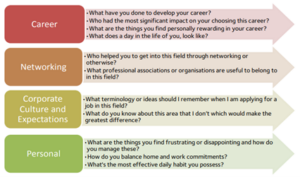There is a confluence of factors that make mentoring in today’s workplace even more valuable. The Great Resignation has led to a wave of retirees leaving the workforce, and with them their wisdom, knowledge and decades of experience gained on the job. As the next generation is learning new skills and industries, having a positive relationship with a mentor increases employee engagement, accelerates career development, promotes a diverse and inclusive workplace, helps retain high performers and can help with even attracting talent to your organization.[1]
Mentors are considered experienced, trusted advisors who share their knowledge, skills and wisdom to help another develop and grow. The goals of mentorship are to help mentees with career growth, introduce new business contacts and act as a resource.
Finding a mentor can seem daunting, but it doesn’t have to be. Mentors literally come in all shapes or sizes! You could ask someone who has your dream job or follow an influencer, leverage a formal workplace program, or draw from your own professional circle or industry resources. What’s key is to find someone that is willing to give you a hand up (not hand out!) and invest time to help in your career development and personal growth.
Once you have found a mentor, be prepared at your first meeting. The mentee drives the conversation around the length of the mentorship, frequency of meetings and sets tasks to be completed prior to each meeting. While that may seem daunting, here is an example of key topics and questions for your first meeting:[2]

As the relationship develops, tasks can be set and completed with both the mentor and mentee discussing progress, obstacles and guidance for future actions. Keep in mind, mentors don’t always tell you want you want to hear, but what you need to hear in order to grow. Feedback is an important element in mentorship, one that takes time to develop expectations and build trust.
There are numerous benefits to being a mentee that include:
- Learn the workplace culture
- Enhance skill development
- Networking opportunities
- Potential for promotion
- Problem-solving
- Knowledge Transfer, to name a few.
There are benefits to being a mentor:
- Validate the mentor’s leadership skills
- Become recognized as an advisor
- Learn to clearly communicate
- Gaining new perspectives
- Giving Feedback and finding new talent, and many more.
Good mentorship programs have the ability to accelerate staff diversity and inclusion too. These programs allow us to see others as people first, moving beyond labels and stereotypes. Mentors and mentees can help each other to redefine normal and create positive experiences within our workplace and communities. It's no wonder that 84% of Fortune 500 companies[3] offer some type of mentorship program. These organizations focus on finding the right match, making expectations clear, offering sufficient training and support, being specific and even making the mentorship program mandatory.[4]
Mentorship can go a long way to improving organizational performance as well as ensuring a pathway for the firm’s continued success. Mentoring is a way of connecting and sharing challenges while obtaining other perspectives from an unbiased resource. It is a great way to develop employees, deepen technical understanding, build connections and strengthen an organization’s talent pipelines.
[1] https://www.togetherplatform.com/blog/what-is-the-purpose-of-mentoring
[2] https://www.griffith.edu.au/__data/assets/pdf_file/0023/552263/MENTEE-FIRST-MEETING-CHECKLIST.pdf
[3] https://www.mentorcliq.com/blog/mentoring-stats
[4] https://www.forbes.com/sites/iese/2022/09/26/the-five-secrets-of-the-best-mentoring-programs/?sh=7a63519b3869
*The views and opinions expressed in the Public Risk Management Association (PRIMA) blogs are those of each respective author. The views and opinions do not necessarily reflect the official policy or position of PRIMA.*

By: Karen Caterino, MBA, ARM-P
Senior Vice President, Alliant Insurance Services, Inc.
Summary of Qualifications
Karen joined Alliant Insurance Services in 2021 and has been in the industry for over 23 years in various positions involving healthcare, risk management and insurance. Prior to joining Alliant, Karen worked at a global insurance brokerage as the Center of Excellence Leader for the western region public sector and higher education practice. Karen also spent 8 years in public service, serving as a city senior benefits/risk analyst and as a state risk manager. She is an active member and presenter with PRIMA and STRIMA and hosts a regular podcast series “Igniting Next Gen” for careers in risk and insurance.
Responsibilities
In her role, Karen works with Alliant colleagues and clients, utilizing her knowledge and understanding of their unique risk and insurance needs to optimize risk management and brokering solutions. Her focus is on leading public entity, education and pooling business growth and development initiatives. Her specialty is casualty line placements. Her background in risk management and insurance, consultative sales leadership, innovative program development and client team management is helping Alliant develop deeper client relationships while delivering excellence to the client experience.
Business Experience
23 years working in risk management and insurance.
ERM Experience
Helping public entity clients implement ERM, advising on integrating business strategies designed to mitigate or optimize organizational enterprise risk.
Professional Affiliations
PRIMA, STRIMA, NV RIMS, AZ PRIMA, OR PRIMA
Education
Karen graduated with her bachelor’s degree from Roanoke College, Salem VA and from University of Phoenix with her MBA. She has an Associate in Risk Management-Public Entities (ARM-P), is a Certified Public Manager®(CPM) and Certified Government Benefits Administrator (CGBA) and is currently a CPCU® candidate.



